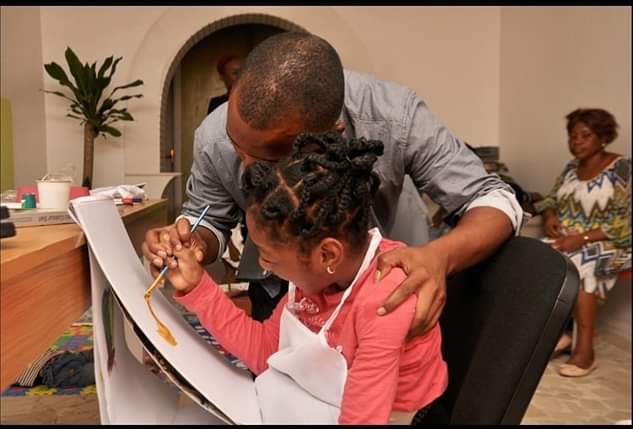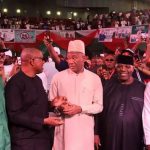OGUDU, LAGOS – Six months after his birth in August 2017, doctors at the Mercy (Children) Hospital in Lagos diagnosed Taiwo with a neurological disorder called cerebral palsy, which results from a disruption in the development of the brain in the womb or shortly after birth.
Cerebral palsy leads to a life-long disability affecting the victim’s ability to move and sustain balance. Because it has no cure and can only be managed, children with the condition often need lifelong care.
Taiwo is one of a set of twins. “I feel bad about his condition,” Tolulope Awolusi, his father, said. “The feeling that he cannot participate in some activities is not good on my part.”
Experts say the disruption in brain development leading to cerebral palsy could be caused by an injury in a part of the brain resulting in decreased blood or oxygen flow or some infections a mother must have had during pregnancy.
“Anything that happens to the brain from inside the womb to the first five years of life can potentially damage the part of the brain that controls movement,” Afolabi Lesi, a professor of pediatric neurology at the Lagos State University Teaching Hospital, told Prime Progress.
Rejection
Cerebral palsy occurs in one to four per 1,000 live births globally. But the prevalence is higher in Africa. Here, it is two to 10 per 1000 live births. In Nigeria, there is no sufficient data to show accurate prevalence, but some estimates say at least 500,000 citizens are affected.
Those with the condition, sometimes erroneously interpreted as spiritual punishment for a child’s parent’s sins, often suffer stigmatisation and rejection in public places and have limited access to economic opportunities.
“We took Taiwo to Providence Height [nursery school] in Lagos [in April 2019], but he was rejected because of his condition,” said Awolusi.
Finding support
But determined to see Taiwo study like every other child, in May that year, Awolusi searched online for organisations or individuals who support children with cerebral palsy to improve their physical condition. That led him to The Let Cerebral Palsy Kids Learn Foundation in Lagos, whose founder, Tobiloba Ajayi, he contacted via Facebook Messenger, explaining Taiwo’s condition.
Ajayi’s Lagos-based nonprofit helps children living with cerebral palsy gain admission into mainstream schools by training parents and teachers in the best ways to relate with the children and help them improve in their studies.
At her office in Lagos, Ajayi explained to Awolusi the process of getting Taiwo into a regular school after conducting a “school readiness assessment” on Taiwo. From the assessment, she identified challenges that could hinder the boy from thriving in school, including writing difficulty.
But she offered tips on Taiwo’s dietary needs, including that he should be fed vitamins and calcium-rich food regularly to help his bones and muscle tones grow stronger to aid his body movement. She also recommended that Taiwo’s food be soft since children with cerebral palsy sometimes find it difficult to swallow or chew.
“Sadly, these are things they did not tell us in the hospital. Taiwo was always lean [because he hardly ate enough food],” Awolusi said. “But we noticed a change when we started following the tips she [Ajayi] gave us.”
Usually, during the assessment, Ajayi determines whether the child needs to see a physiotherapist for medical attention or whether to proceed with school placement support, which entails identifying a school with trained teachers and placing the child there.
Taiwo did not need to see a therapist. With improvements in his ability to maintain balance and control body movements following the dietary recommendations, Ajayi proceeded to place him at Inspired Christian Learning Centre in Lagos, where he is currently in nursery two with Kehinde, his twin brother.
“[Ajayi’s] organisation gave us hope. Taiwo and Kehinde would not have started school because I won’t allow Kehinde to go to school without Taiwo,” Awolusi said. “[Now] I get good reports from the school about his progress, which makes me happy.”
‘A keg of gunpowder’
Ajayi herself is a person living with cerebral palsy. But she did not face much rejection growing up because she had an educated and supportive family that gave her the support she needed, including placing her in non-discriminatory schools. This boosted and kept her confidence throughout her formative years up to the university as a law student.
Her motivation to support kids with cerebral palsy came when she was in the US in 2016 as a Mandela Washington Fellow having her leadership training at the Presidential Precinct, an organisation equipping emerging leaders to address pressing issues in their countries.
During the period, Presidential Precinct did and published the impact stories of fellows on Youtube. Surprisingly, Ajayi’s story, which centred on her experience with cerebral palsy, went viral. It generated reactions from people, mostly Nigerian parents with children with cerebral palsy, who wanted to know how she went through school without rejection and grew to global recognition.
Some sent her direct messages on social media explaining how their children with the condition were being rejected in public and even private institutions.
When she returned to Nigeria after her fellowship, 36-year-old Ajayi started meeting with parents of children living with cerebral palsy and teachers and owners of private schools to know why mainstream schools were rejecting children with the condition. She soon identified that most teachers were not trained to help such kids, and parents frequently hid their children due to fear of stigma.
She then launched The Let Cerebral Palsy Kids Learn Foundation – which now has 14 volunteers – to solve these problems.
Twice yearly, it organises a one-day training for parents and teachers, each participant paying N7, 500 about ($17). The training, held every January and September, is facilitated by Ajayi and Rhoda Odigboh, a curriculum theorist and inclusive education advocate.
Teachers learn how to design lesson plans that will serve the educational needs of children with cerebral palsy and those without it in the classroom. The teachers are divided into small groups and guided to design lesson plans in four approaches – visual, auditory, aesthetics, and read and write elements.
Ajayi said presenting lesson plans in a single approach limits the learning ability of children living with cerebral palsy. “But the biggest impact so far is that the training helps to improve learning in the classroom,” she said.
Ajayi only places children with cerebral palsy at schools whose teachers her foundation had trained. The foundation provides free specially designed learning materials like chunky coloured pencils and jumbo crayons for children with cerebral palsy to make their learning easy. Ajayi said 110 children have been supported with school placements since she launched in March 2017.
Her foundation has held eight training sessions involving 500 parents and teachers from about 50 schools in Lagos.
“For us, the fact that people now know that cerebral palsy is not a contagious disease and that it is not synonymous with an intellectual disability is a major win,” Ajayi said.
But dealing with parents’ attitudinal issues remains a challenge. She said some parents still feel ashamed of their children and barely give correct information about their condition during counselling.
“They lie, making it difficult to recommend the best [approach]. So to avoid giving wrong recommendations, I ask them to override that natural bias and not see the child as disabled,” Ajayi said.
She hopes that “In the near future, we should not ask ‘should children with cerebral palsy go to school?’ What we should be talking about is getting scholarships for these children.”
Today, Awolusi is happy with Taiwo’s improvement at school. The boy wants to become a lawyer like Ajayi when he grows up, and his father says he is determined to give him (Taiwo) all the support so “he [can] defend people as well.”
This story was produced with the support of Nigeria Health Watch through the Solutions Journalism Network, a nonprofit organisation dedicated to rigorous and compelling reporting about responses to social problems.





